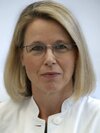Dr. med Kristin Kieselbach
Lebenslauf / Curriculum vitae
Ärztliche Leiterin des Interdisziplinären Schmerzzentrums Freiburg
Fachärztin für Neurochirurgie, Spezielle Schmerztherapie und Spezielle Intensivmedizin
E-Mail: simone.mayer@uniklinik-freiburg.de
Telefon 0761 270 93490
int. call +49 761 270 93490
| 1985/86 - 1993 | Studium der Humanmedizin, Universität Heidelberg |
| 13. November 1995 | Approbation als Ärztin |
| 1987 - 1988 | Sprachkurs für Portugiesisch, Universität Coimbra, Portugal |
| Oktober 1992 - Januar 1993 | Chirurgie - Terzial, Texas Heart Institut, Houston, Texas |
Ärztin im Praktikum:
| März - Mai 1994 | Institut für Pathologie, Klinikum Regensburg |
| Juni 1994 - Oktober 1995 | Neurochirurgische Klinik, Universität Heidelberg |
Dissertation:
Thema: „Charakterisierung des TP53 – Signalweges an klinisch – molekularbiologisch definierten Glioblastom – Subtypen“.
Promotion am 18.8.2003 (magna cum laude).
Ausbildung / Weiterbildung:
| Oktober 1995 – Dezember 2003 | Wissenschaftliche Angestellte, Neurochirurgische Uniklinik Heidelberg |
| 30. Juli 2003 | Facharztprüfung für die Gebietsbezeichnung Neurochirurgie |
| Januar 2004 – August 2006 | Fachärztin am Städtischen Klinikum Karlsruhe, Neurochirurgische Klinik |
| März – August 2006 | Funktionsoberärztin der Neurochirurgischen Intensivstation, Neurochirurgische Betreuung der Bereiche Onkologie und Schmerztherapie |
| 18. August 2005 | Anerkennung der Zusatzbezeichnung "Spezielle Schmerztherapie" |
| 15. August 2006 | Anerkennung der Zusatzbezeichnung „Spezielle Neurochirurgische Intensivmedizin“ |
| September 2006 – Februar 2008 | Fachärztin / Funktionsoberärztin am Klinikum Nürnberg, Neurochirurgische Klinik (Aufbau der Neurochirurgischen Schmerzambulanz, Projektleitung in der Neurochirurgischen Onkologie, interdisziplinäre Betreuung der Intensivstation und der Intermediate Care Station) |
| März 2008 – Februar 2012 | Geschäftsführende Oberärztin am Interdisziplinären Schmerzzentrum, Uniklinik Freiburg |
| Seit März 2012 | Ärztliche Leiterin des Interdisziplinären Schmerzzentrums ISZ der Universitätsklinik Freiburg |
- Leitung der Tagesklinik mit multimodalem Behandlungsschwerpunkt
- Interventionelle Therapie von Schmerzpatienten
- Neurochirurgische Behandlungsverfahren (epidurale Rückenmarksstimulation (SCS), Schmerzpumpen)
- Neurochirurgische Behandlung bei therapieresistenten Gefäßerkrankungen durch epidurale Rückenmarksstimulation (SCS)
- Etablierung einer Kooperation mit Kollegen aus Kardiologie/Angiologie und Gefäßchirurgie (Angioportal)
- Neurochiurgische Behandlung von Cluster-Kopfschmerzpatienten mit SCS
Publikationen von Frau Dr. K. Kieselbach (geb. Münkel)
36: Dombrowski F, Wirz S, Hofbauer H, Kowark P, Erlenwein J, Stamer U, Kieselbach K. Influence of health care crises on the treatment of cancer pain: a presentation using the example of the COVID-19 pandemic from the provider's perspective. Schmerz. 2024 Sep 5. doi: 10.1007/s00482-024-00826-w. Epub
35: Abberger B, Grauer T, Kieselbach K. The Use of Telemedicine in an Interdisciplinary Pain Center in the Years 2020 and 2021 in Germany: Effects of the COVID-19 Pandemic. Telemed J E Health. 2024 Jul 29. doi: 10.1089/tmj.2024.0192. Epub
34: Kieselbach K, Fauler I, Abberger B. Patients With Chronic Pain: The Aspect Of Negative Body Image. Psychother Psychosom Med Psychol. 2024 Jun 17. doi: 10.1055/a-2322-8484. Epub
33: Abberger B, Kieselbach K. Rasch analysis of the Depression, Anxiety, and Stress Scale in patients with chronic pain. J Psychosom Res. 2024 Jan 22;178:111597. doi: 10.1016/j.jpsychores.2024.111597. Epub
32: Kieselbach K, Frede U. Spirituelle Interventionen in der multimodalen Schmerztherapie. [Spiritual interventions in multimodal pain management]. Schmerz.2024 Jan 15. doi: 10.1007/s00482-024-00788-z. Epub
31: Kieselbach K, Koesling D, Wabel T, Frede U, Bozzaro C. Chronischer Schmerz als existenzielle Herausforderung. [Chronic pain as an existential challenge]. Der Schmerz, 37 (2023) ,2 ,116-122 . Epub
30: Irnich D, Bäumler P, Beißner F, Broscheit J, Cramer H, Fleckenstein J, Kieselbach K, Langhorst J, Lucius H, Michalsen A, Seifert G, Usichenko T. Wissenschaftliche Mängel im CME-Artikel zur Komplementärmedizin in der Schmerztherapie [Scientific shortcomings in the CME article on complementary medicine in pain therapy]; Schmerz. 2023 Oct;37(5):372-377. doi: 10.1007/s00482-023-00758-x. Epub 2023 Sep 20. Epub
29: Franz J, Kieselbach K, Lahmann C, Gratzke C, Miernik A. Dtsch Arztebl Int. Chronic Primary Pelvic Pain Syndrome in Men—Differential Diagnostic Evaluation and Treatment.2023 Jul 24;(Forthcoming):arztebl.m2023.0036. doi: 10.3238/arztebl.m2023.0036. Epub.
28: Beck J, Hubbe U, Klingler JH, Roelz R, Kraus LM, Volz F, Lützen N, Urbach H, Kieselbach K, Fung C. Minimally invasive surgery for spinal cerebrospinal fluid leaks in spontaneous intracranial hypotension. J Neurosurg Spine, 2022, 38(1), 147-152. Epub
27: Wirz S, Schenk M, Kieselbach K. Unerwünschte Wirkungen von Opioiden, Antidepressiva und Antikonvulsiva auf Sexualhormone. [Adverse effects of opioids, antidepressants and anticonvulsants on sex hormones: Often unnoticed but clinically relevant]. Schmerz, 2022, 36(4), 293-307. Epub
26: Kleinmann B, Abberger B, Kieselbach K, Wolter T: Patients with Chronic Pain Prefer Maintenance of Pain Treatment Despite COVID-19 Pandemic Restrictions. Pain Physician, 2021; 24 (2): 165-173. Epub
25. Wirz S, Schenk M, Hofbauer H, Wartenberg HC, Cascella M, Kieselbach K: Nicht-indikationsgemäßer Einsatz schnell freisetzender Fentanylzubereitungen: Stichprobenartige Fragebogenerhebung bei Kongressteilnehmern und Schmerzmedizinern. [Use of rapid-onset fentanyl preparations beyond indication: A random questionnaire survey among congress participants and pain physicians]. Schmerz, 2021; 35(2):114-123. doi: 10.1007/s00482-020-00503-8. Epub
24. Koesling D, Kieselbach K, Bozzaro C: Chronischer Schmerz und Gesellschaft: Soziologische Analyse einer komplexen Verschränkung. [Chronic pain and society: Sociological analysis of a complex interconnection]. Schmerz, 2019; 33(3):220-225. Epub .
23. Wirz S, Schenk M, Kieselbach K: Schmerztherapeutische Aspekte bei Tumoroperationen [Pain Therapy Aspects in Tumour Surgery]. Anasth Intensiv Notf, 2018; 53 (10): 704-717. Epub .
22. Wirz S, Schenk M, Hofbauer H, Kieselbach K: Wenn Tumorschmerzen chronisch werden MMW Fortschr Med, 2017; 159 Suppl. 1: 78-81. Review. Epub .
21. Hofbauer H, Schenk M, Kieselbach K, Wirz S: Einsatz von Methadon zur Unterstützung der onkologischen Therapie? - Eine Stellungnahme des Arbeitskreises Tumorschmerz der Deutschen Schmerzgesellschaft. Schmerz, 2017; 31 (1): 2-4. Epub .
20. Kieselbach K, Schiltenwolf M, Bozzaro C: Versorgung chronischer Schmerzen. Wirklichkeit und Anspruch. [Chronic pain care : Reality and entitlement]. Schmerz, 2016; 30 (4): 351-357. Epub . PubMed PMID:27402265
19. Schiltenwolf M, Kieselbach K, Bozzaro C: Schmerz aus anderen Perspektiven. [Pain from different perspectives]. Schmerz, 2016; 30 (4): 315-316. Epub . PubMed PMID:27286835
18. Coenen VA, Kieselbach K, Mader I, Reinacher PC. Diffusion tensor magnetic resonance imaging (DTI) tractography-guided deep brain stimulation in neuropathic pain. Acta Neurochir (Wien). 2015 April 157(4):739-41. [Epub] PubMed PMID: 25652721.
17. Wolter T, Kieselbach K, Sircar R, Gierthmuehlen M. Spinal cord stimulation inhibits cortical somatosensory evoked potentials significantly stronger than transcutaneous electrical nerve stimulation. Pain Physician. 2013 Jul-Aug;16(4):405-14. PubMed PMID: 23877457.
16. Wolter T, Fauler I, Kieselbach K. The impact of psychological factors on outcomes for spinal cord stimulation: an analysis with long-term follow-up. Pain Physician. 2013 May-Jun;16(3):265-75. PubMed PMID: 23703413.
15. Wolter T, Kieselbach K. Cervical spinal cord stimulation: an analysis of 23 patients with long-term follow-up. Pain Physician. 2012 May-Jun;15(3):203-12. PubMed PMID: 22622904.
14. Wolter T, Kieselbach K. Spinal cord stimulation for Raynaud's syndrome: long-term alleviation of bilateral pain with a single cervical lead. Neuromodulation. 2011 May-Jun;14(3):229-33; discussion 233-4. doi: 10.1111/j.1525-1403.2011.00332.x. Epub 2011 Mar 1. PubMed PMID: 21992245.
13. Kieselbach K und Kaube H. Neuromodulation (SCS) gegen vaskuläre Schmerzen. Angewandte Schmerztherapie und Palliativmedizin, 1: 49 - 51, 2009
12. Tronnier VM, Fogel W, Krause M, Bonsanto MM, Tronnier J, Heck A, Münkel K, Kunze S. High frequency stimulation of the basal ganglia for the treatment of movement disorders: current status and clinical results. Minim Invasive Neurosurg. 2002 Jun;45(2):91-6. Review. PubMed PMID: 12087506.
11. Hartmann M, Jansen O, Heiland S, Sommer C, Münkel K, Sartor K. Restricted diffusion within ring enhancement is not pathognomonic for brain abscess. AJNR Am J Neuroradiol. 2001 Oct;22(9):1738-42. PubMed PMID: 11673170.
10. Münkel K, Neher M, Rasche D, Hashemi B, Aschoff A. Complications of ICP - monitoring. A metaanalysis of 14.500 cases. 51. Jahrestagung der Deutschen Gesellschaft für Neurochirurgie. Zentralbl Neurochir Heidelberg, 2000, Sonderausgabe.
9. Kraus A, Gross MW, Knuechel R, Münkel K, Neff F, Schlegel J. Aberrant p21 regulation in radioresistant primary glioblastoma multiforme cells bearing wild-type p53. J Neurosurg. 2000 Nov;93(5):863-72. PubMed PMID: 11059670.
8. Hähnel S, Freund M, Münkel K, Heiland S, Jansen O, Reidel M, Sartor K. Magnetisation transfer ratio is low in normal-appearing cerebral white matter in patients with normal pressure hydrocephalus. Neuroradiology. 2000 Mar;42(3):174-9. PubMed PMID: 10772137.
7. Haag P, Münkel K, Meinck HM. [Late myelopathy after chemonucleolysis. Case report and review of the literature]. Nervenarzt. 1999 Oct;70(10):920-3. Review. German. PubMed PMID: 10554785.
6. Hähnel S, Münkel K, Jansen O, Heiland S, Reidel M, Freund M, Aschoff A, Sartor K. Magnetization transfer measurements in normal-appearing cerebral white matter in patients with chronic obstructive hydrocephalus. J Comput Assist Tomogr. 1999 Jul-Aug;23(4):516-20. PubMed PMID: 10433276.
5. Kraus A, Neff F, Behn M, Schuermann M, Muenkel K, Schlegel J. Expression of alternatively spliced mdm2 transcripts correlates with stabilized wild-type p53 protein in human glioblastoma cells. Int J Cancer. 1999 Mar 15;80(6):930-4. PubMed PMID: 10074928.
4. Schlegel J, Muenkel K, Trenkle T, Fauser G, Ruschoff J. Expression of the ERBB2/neu and neurofibromatosis type 1 gene products in reactive and neoplastic schwann cell proliferation. Int J Oncol. 1998 Dec;13(6):1281-4. PubMed PMID: 9824645.
3. Stark A, Münkel K, Bortolussi G, Eifert B, Kunze St, Schlegel J Expression levels of the p53 cascade and ist regulatory loop give mechanistic insights into the development of de novo versus secondary human glioblastoma . J Mol Med 75, 1997
2. Münkel K, Stark A, Bortolussi G, Eifert B, Kunze St, Schlegel J. Expression levels in human glioblastoma cells of the cell cycle regulators ATM, p53 and downstream effectors give insights into the pivotal role of p53. J Cancer Res Clin Oncol, 123 (Suppl 1) S1 - S48, 1997
1. Schlegel J, Vogt T, Münkel K, Rüschoff J. DNA fingerprinting of mammalian cell lines using nonradioactive arbitrarily primed PCR (AP-PCR). Biotechniques. 1996 Feb;20(2):178-80. PubMed PMID: 88251
Liste mit den Publikationen von Frau Dr. K. Kieselbach (PubMed-Datenbank)
Frühere Veröffentlichungen als PDF-Datei
Publikationsliste von Frau Dr. K. Kieselbach (geb. Münkel)
Thema der Dissertation
„Charakterisierung des TP53 – Signalweges an klinisch – molekularbiologisch definierten Glioblastom – Subtypen“.
Promotion am 18.8.2003 (magna cum laude).
Download Zusammenfassung der Dissertation
Zusammenfassung der Dissertation von Frau Dr. Kieselbach als PDF-Datei


